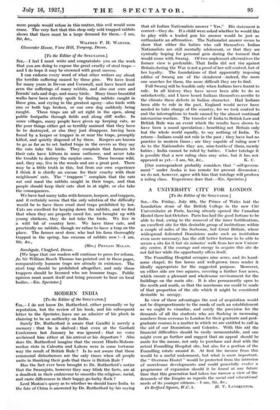[To the Editor of the SPECTATOR.] SIR,—I feel I must
write and congratulate you on the work that you are doing to expose the great cruelty of steel traps— and I do hope it may be crowned with great success.
I can endorse every word of what other writers say about the terrible suffering caused by these gins. We have lived for many years in Devon and Cornwall, and have heard and peen the sufferings of many rabbits, and also our own and riends' cats and dogs, and many birds. Many times beautiful walks have been utterly spoilt by finding rabbits caught in these gins, and crying in the greatest agony—also birds with one or both legs broken, or our own dog suddenly being caught. These traps are all set right in the open, along public footpaths through fields and along cliff walks. In some villages, many people have given up keeping cats, as the poor things either get so terribly maimed that they have to be destroyed, or else they just disappear, having been found by a keeper or trapper in or near the traps, promptly killed, and quietly disposed of by them. Keepers are known to go as far as to set baited traps in the covers as they say the cats take the birds. They complain that farmers let their cats have kittens in some outhouse, and never take the trouble to destroy the surplus ones. These become wild, and, they say, live in the woods and are a great pest. There may be a little truth in this, but from our own experience I think it is chiefly an excuse for their cruelty with their neighbours' cats. The " trappers " complain that the cats eat and maul the rabbits caught in their traps, and that people should keep their cats shut in at night, or else take the consequences.
We have had many talks with farmers, keepers, and trappers, and it certainly seems that the only solution of the difficulty would be to have these cruel steel traps prohibited by law. Cats are excellent for keeping down the rabbits, and we find that when they are properly cared for, and brought up with young chickens, they do not take the birds. We live in a wild bit of country here. We have three cats, and practically no rabbits, though we refuse to have a trap on the place. The fanner next door, who had his farm thoroughly trapped in the spring, has swarms of rabbits now !—I am, Sir, &c.,
MTS.) PHYLLIS MALA-N.
Sandsgate, Chagford, Devon.
[We hope that our readers will continue to press for reform. As Sir William Beach Thomas has pointed out in these pages, comparatively humane traps are already in existence. The steel trap should be prohibited altogether, and only those trappers should be licensed who use humane traps. Public opinion must assert itself and bring pressure to bear on local bodies.—En. Spectator.]










































 Previous page
Previous page